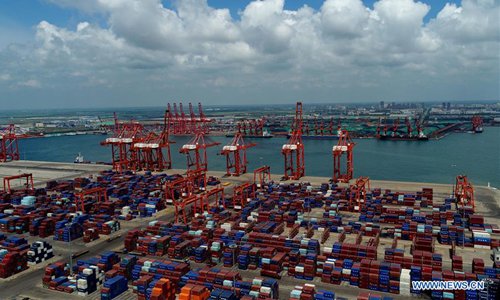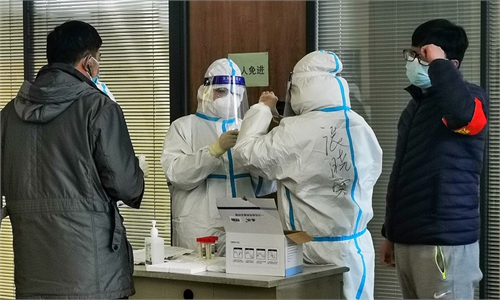Tangshan Port resilient amid outbreak
China's largest trading facility for coal prepared

Aerial photo shows the railway container freight dock at Jingtang port area of Tangshan Port, north China's Hebei Province. (Photo: Xinhua)
Amid city lockdowns and logistics disruptions caused by a sudden coronavirus outbreak in North China's Hebei Province, the region's Tangshan Port - a major domestic facility for bulk commodities such as steel, iron ore and coal - is operating normally despite hardships caused by the coronavirus.
Hebei reported 90 new COVID-19 cases on Tuesday, and the cities of Shijiazhuang, Xingtai and Langfang are being locked down, Hebei health authorities reported on Tuesday.
In the center of the regional outbreak, Tangshan Port, the world's third-largest in terms of iron ore imports and unloading capacity, and the largest port for steel exports, is striving to ensure that trade runs smoothly.
In 2019, the cargo throughput of Tangshan Port reached 657 million tons and container throughput reached 2.9434 million 20-foot equivalent units, up 2.67 times and 10.64 times from 2010, respectively.
Given the great significance of the port, amid the outbreak, all the staff at ports have taken nucleic acid tests and some have received COVID-19 vaccines, the Global Times has learned. Employees were also asked not to leave Tangshan unless necessary and report their travel records as part of the strict mechanism of the port management at this peculiar time.
A source at the port told the Global Times on Wednesday that daily operations are normal with no substantial impact from the outbreak or the precautionary measures.
In addition to mandatory measures such as mask-wearing and regular disinfection, all employees have been told to move into a dormitory near the port to reduce the risk of infection, a manager surnamed Zhong with a port shipping freight agency told the Global Times on Wednesday.
The sudden outbreaks led to some concerns of supply disruptions, industry insiders said.
Zhong said that the company is losing orders due to the outbreaks, as some clients seek options in other places.
A manager of a local freight service provider surnamed Dai who is in the steel and coal trading business told the Global Times that there are transportation hurdles for truck drivers. But he said that it's necessary to prevent an epidemic and his business is likely to remain resilient.
On Wednesday, coking coal futures plunged, with the price down more than 6 percent at one point before closing with a 5.17-percent decline from Tuesday's settlement.
Iron ore futures prices fluctuated and finally closed at 1,034 yuan ($160), up 0.05 percent from the previous trading day's settlement price.
Industry experts believe that the regional outbreaks won't have much impact on trade in bulk commodities, given strict preventative measures and high resilience in supply chains.
Although Tangshan Port is an important facility for coal imports, there are alternatives, Wang Guoqing, research director at the Beijing Lange Steel Information Research Center, told the Global Times on Wednesday. "Shipments can be rerouted to Dalian, Rizhao or Tianjin," Wang said.
But Wang said that risks to Tangshan are lower than for facilities that handle cold-chain products. "In the cold-chain sector, the risk of contamination largely comes from human contact, especially staff loading and unloading products," while bulk commodities like steel are usually handled by machinery.
The easing trend of the epidemic in Hebei will help sectors such as steel and coal trading. The Hebei outbreak has been monitored for 11 days and is expected to recede soon, based on experience that shows it usually takes two to three weeks to clear new infections, Feng Zijian, deputy director of the China Center for Disease Control, said at a press conference on Wednesday.

